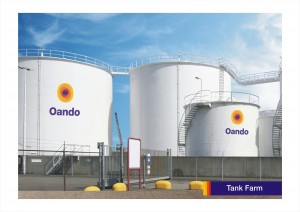Which Should Relocate: Tank Farms Or Residential Buildings?

The Federal Government’s proposed relocation of tank farms to non-residential area has generated a lot of questions than answers.
The issue has generated so much concern in recent time that it has become a fly perched on human scrotum that requires dexterity to handle less one runs the risk of hurting oneself.
The idea of relocating the tank farms sited along Tin an Island and Apapa sea shores was muted in 2008 when Mrs. Diezani Alison-Madueke, was the minister of Transport. At a meeting with tank farm operators and petroleum marketers in Eko Hotel, Lagos, she briefed them of government’s worry about the menace of the indiscriminate siting of the storage facilities along the road and its environmental hazards to the residents.
The Apapa-Ijora and Tin can Island _ Oshodi axis had started experiencing heavy traffic jam as a result of the tank farm operation. In spite of this, the operators defied the warning and kept building more. Alison-Madueke did nothing to stop the mess. The operators had argued that the relocation could cause fuel scarcity.
In 2012, faced with greater danger, the government after a series of inspections and visits to experience the problem, on the two axes bought the submission of the tank farm operators that the cost of relocating a tank farm is equivalent to the cost of building a new one. It was Prof. Sylvester Monye, the Special Adviser (SA) to President on Monitoring and Performance Evaluation who doubles also as the Chairman of the Port Reforms Committee who briefed President Goodluck Jonathan as such. Silence has been the game since then, while the economy bleeds through one of its key arteries, the port. The Apapa economy is in shambles following the daily nightmares experienced by road users, all because of the “insensitivities of some business operators and government.”
The questions raised in the process were: what is the role of Department of Petroleum Resources (DPR) in the location of a petroleum storage facility? Who approved these tank farms? Wasn’t there Environmental Impact Assessment (EIA)?
MMS Plus Weekly gathered that DPR has abdicated its function EIA to operators. There is a syndicate in DPR that collects money from prospective tank farm owners and allow them to conduct an independent EIA for a chosen location and present the report to DPR thereafter whereas it is the duty of DPR to conduct such. One of the operators who revealed this said, “go and see how young mployees of DPR are building mansions all over cities in the country beause of location of tank farms that have become a sore thumb in downstream operation of the petroleum industry.”
However, since relocating the tank farms has become impossible because of the cost implication and lack of political will on the part of government, a school of thought has tinkered with the option of relocating the people to reduce the hazard associated with the co-existence of the people and the tank farms at locations.
Expectedly, opinions are divided on which should be relocated.
Some said that the residential buildings should be relocated, that it is safer and cheaper; others suggest that the Tank Farms should be relocated because of their risk implications, while others too heap the blame on the Government for creating the problem.
Some operators of Tank Farms claimed that the area was mapped out by the Government for Tank Farms even before the residential buildings. One of them Tony Nnorom, the Depot Engineer of Total Depot Ibafon ask the question, “Which one came first? Which is supposed to move, the supposed danger or humans and moreover which is easier moved? He queried.
According to him, “Tank Farms plants are a work place for humans too, so even if they are relocated to another area, the people who work there would want to look for a place near the area so that they can access their work places easily.”
Mr Nnorom stated further that it is not moving the Tank Farms that matters but for people to be aware of their surroundings and conscious of the risks and hazards associated with work places so as to be able to avert danger when it comes.
The sole purpose of erecting Tank Farms is to store petroleum products and these products are imported through the sea, so it is pertinent that Tank Farms are situated along the sea shores for smoother discharge of products by ships and the areas the Tank Farms are situated, the Apapa and Cocoanut seashores are just fine.
There is a school of thought that believes that the Government should be blamed for apportioning a place for siting of Tank Farms and then allowing people to reside within the same vicinity.
One of them is Mr Albert Mabiaku, the Public Relations Officer(PRO) of Total Nig Plc when asked of which should be relocated, the residential buildings or the Tank Farms he said “ Go and ask the Government, the Government gave us the place to operate, so go and ask them which one they want to relocate” .
A staff of Gulf Treasure, one of the operators of Tank Farms who prefers to remain anonymous said when asked about the Government’s plan to relocate the Tank Farms, she asks “Why does the Government want to relocate it now? Don’t they know that they will eventually do so before they put the two together? And how do they plan to do so?
The Public Relations Officer of Aquitane Oil centered his argument on the cost of moving the Tank Farms. He said that since it was the Government that allotted the area for the operators of Tank Farms to operate, it behoves on the Government too to pay compensation if they (Tank Farm Operators) eventually move. According to him “the cost of moving will be so high that it will be better expended on something else more worthwhile”.
When accosted with the same questions, the General Secretary of the National Union of Petroleum and Natural Gas Workers (NUPENG) said, “We are not the owners of the tank farms; we are not government that gave them licence to build those tank farms.”
On the stand of the union on the location of the tank farm and the possible hazard in case of emergency he said, “But that is not to say tank farms are built in residential areas. We have the tank farms towards the coast line and sea-ward on the right hand side of the Oshodi/Apapa from West Minister to Tin-Can Island. They may be close and tankers may park at the residential side of the road but to say they are built within the residential areas is not true. But I don’t like the way the tank farms are built around the operational areas where the tank farms are situated. They are too near and concentrated; there are congestions of tank farms in that place; that is what is also giving reason for influx of trailers going there to load. I think government should come up with a policy not to issue new licence for tank farms to be built in that place any longer. They can take some to Badagry, Epe where there are access to the sea rather than concentrate all of them in one place.
The issue is a very dicey and controversial one. Some people concerned do not want to lend their voices to the argument because of not knowing what it may cause them.
But the fact remains that the Government has a lot do in settling these issues. The problem it seems started with the Government. The question is why erect Tank Farms in the first place? Tank Farms were erected just because the Government does not have enough Refineries to meet the needs of Nigerians, and the Refineries in the country are not working at full capacity, so there is need for the importation of petroleum products to meet these needs. And when the products are imported they have to be stored somewhere, hence the Tank Farms.
So, the Government can settle the issue by building more refineries that can cater for the needs of Nigerians and by so doing the Tank Farms will dry up so to speak.
The question is, are Tank Farms a menace? Tank farms are no menace but people always believe that things might go wrong one day and the whole place will be in flames. So, if there is this eventuality, what should people do? Should they wait for government to remove the danger or should they on their own run away from the danger?
Moreover, it just seems that the government is in a dilemma of which one should relocate. Is it the Tank Farms with its high cost implications or the residential buildings with people with feelings and emotions? Time will tell.








